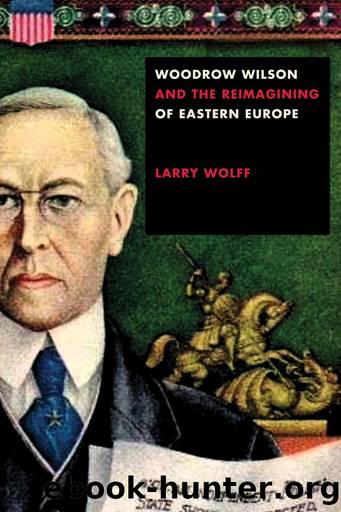Woodrow Wilson and the Reimagining of Eastern Europe by Wolff Larry;

Author:Wolff, Larry; [Wolff, Larry]
Language: eng
Format: epub
Publisher: Stanford University Press
Published: 2019-06-15T00:00:00+00:00
FIGURE 6. The National Theater in Zagreb as centerpiece of Wilsonov Trg (Wilson Square). Before the war it was called University Square. It was Wilson Square from 1919 to 1927. It was subsequently renamed first for King Alexander of Yugoslavia and eventually for Tito. Today it is the Republic of Croatia Square.
Both Wilson and Lloyd George agreed that the Slavs constituted a potential threat to Italy, based on their backwardness. If Germany was better organized and educated, and Russia less so, then the Slavs of Eastern Europe who lay in between them geographically might have been mapped onto a civilizational incline of greater and lesser development. On the whole, however, Wilson seemed to believe that the Slavs in general were more closely aligned with Russian backwardness, which, in Lloyd Georgeâs political schema, put them all at risk for either tyranny or anarchy, each Slavic state a potentially unstable and volatile element in the geopolitical Wilsonian settlement. The triggering mechanism would be Slavic âdiscontent,â which Wilson now urgently sought to reduce and avert.
Armed with a map (which he had received from Bowman) Wilson attempted to prove to the Italians that the territories they claimed were ethnographically Slavic, not Italian:
I have before me an Italian map published before the war, that of Marinelli, which would be sufficient to contradict the Italian argument; it shows that, aside from the southern portion of the island of Cherso and the island of Lussino, there are Italian elements only on some isolated points. What discourages me is that, when Italy has made proposals, they dissolve as soon as one tries to be precise.96
Wilson with a map in his hand, confident in his own precision, seemingly unaware that his maps were powerfully shaped by his own sympathies, would never understand the Italian perspective on islands like Cherso and Lussino (Cres and LoÅ¡inj under their South Slavic names), which he himself was only just now discovering on the map. In 1770, an Italian naturalist, Alberto Fortis, had visited these Adriatic islands and written about them as objects of Venetian imperial administration. Like Herder, Fortis contributed to the Enlightenmentâs understanding of the wider Slavic world.97 Wilson was only beginning to understand that mapping the Slavic world, both geographically and ethnograpically, was not necessarily a matter of scientific precision but often existed within the volatile domain of culture and mentality, shaped by a long historical legacy. He did not always understand how his own attempted interventions fit with earlier perspectives on Eastern Europe.
Colonel House in Paris expressed the opinion that âItaly has gone mad,â while Herron in Switzerland took a strong public position in favor of Italyâwhich led to Wilsonâs renunciation of his impassioned friend: âI am through with him,â the president announced to House.98 If the Italians were no longer Wilsonâs friends, then the friends of the Italians were also no longer Wilsonâs friends. âThe Italians must realize, furthermore, that they can not have what they want without the consent of the United States,â Wilson commented. âIf their only preoccupation is to save their pride, they are throwing themselves into an impasse.
Download
This site does not store any files on its server. We only index and link to content provided by other sites. Please contact the content providers to delete copyright contents if any and email us, we'll remove relevant links or contents immediately.
The European History Highway: A Guide to Internet Resources by Dennis A. Trinkle Scott A. Merriman(498)
The Seven Wonders of the Ancient World by Michael Denis Higgins(479)
European Security in a Global Context by Thierry Tardy(472)
European Security without the Soviet Union by Stuart Croft Phil Williams(472)
The Routledge companion to Christian ethics by D. Stephen Long Rebekah L. Miles(461)
Hudud Al-'Alam 'The Regions of the World' - a Persian Geography 372 A.H. (982 AD) by V. V. Minorsky & C. E. Bosworth(402)
Gorbachev And His Generals by William C. Green(393)
Get Real with Storytime by Julie Dietzel-Glair & Marianne Crandall Follis(391)
Tibetan Studies in Comparative Perspective by Chih-yu Shih Yu-Wen Chen(387)
Governance, Growth and Global Leadership by Espen Moe(385)
Hyperculture by Byung-Chul Han(382)
CliffsNotes on Fitzgerald's The Great Gatsby by Kate Maurer(363)
The Oxford History of the World by Fernández-Armesto Felipe;(357)
How Languages Are Learned 5th Edition by Patsy M Lightbown;Nina Spada; & Nina Spada(355)
The Egyptian Economy, 1952-2000 by Khalid Ikram(355)
Oral Poetry and Narratives from Central Arabia: The Poetry of Ad-Dindan : A Bedouin Bard in Southern Najd (Studies in Arabic Literature, Vol 17) (English and Arabic Edition) by P. M. Kupershoek P. Marcel Kurpershoek(345)
The Oxford Handbook of the Incas by Sonia Alconini(336)
Europe Contested by Harold James(323)
The Hutchinson Dictionary of Ancient and Medieval Warfare by Peter Connolly John Gillingham John Lazenby(308)
